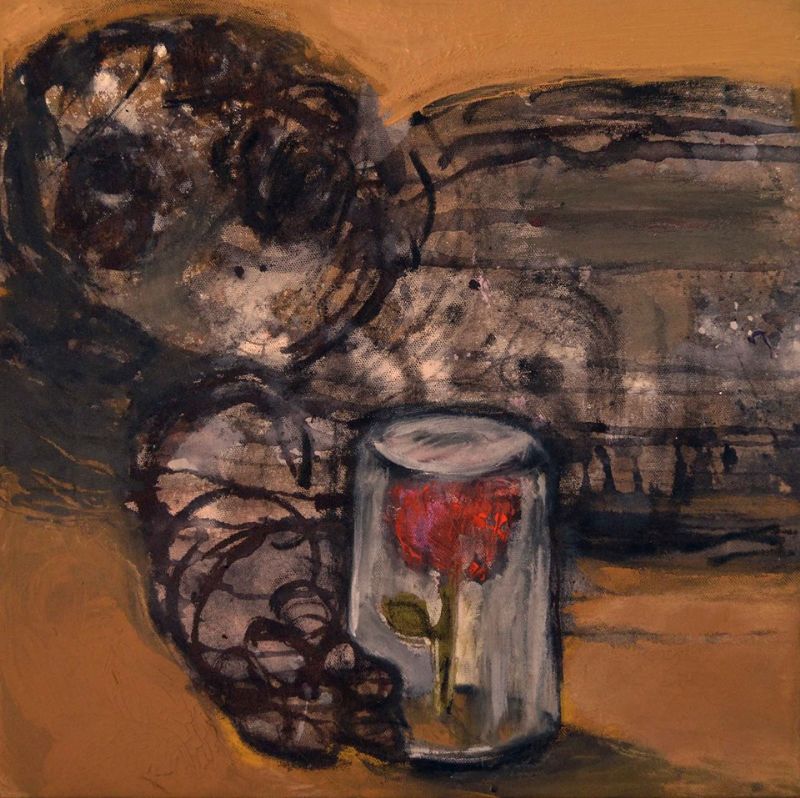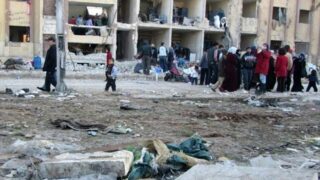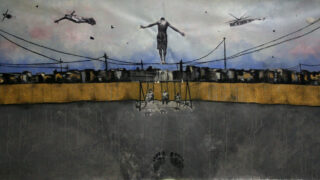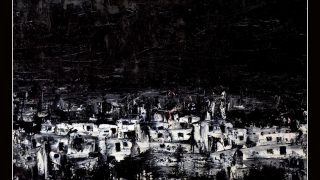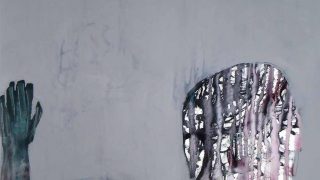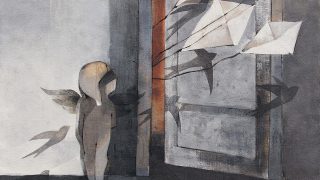No one really knows how the neighborhood ended up with such a name.
It is an extension of the slum that crawls out from the edge of the Sheikh Maqsud district in the northwest of Aleppo, extending into a vast quarry-like bare plain that in the old days was called the “shooting range.” The soldiers of the “popular army” created by the ruling party in the sixties used to practice shooting here.
Perhaps the reason they called the area “The European Union” lay in all of the tiny rooms that looked out over the neighborhood’s sand and gravel alleyways. As time went by their fourth walls were erased to give way to open shops, where television screens reign as kings, elevated on thrones of plastic tables or wooden shelves, facing constellations of chairs, coffee tables and hookahs. Little shops became magnets for the young men who follow the European football league matches, where wagers are organized, where any demand can be met, whether it is public-hookahs, hot or cold drinks; or secret-pills, opiates, sedatives.
Naked streets that have never seen the hand of an engineer, who might have leveled the dirt, tamped the gravel, coated it all with asphalt.
Water runs out from the sinks and toilets, filters through the breaches in the bottoms of walls, streams into the streets.
Electric wires sprout from the tops of the houses, indistinguishable from the laundry lines. Satellite dishes are fixed for eternity on every roof corner.
Laundry hangs on the lines, pouring gouts of water, betraying the women’s disinterest in wringing out their washed clothes.
No trace whatsoever of the state’s presence here. No schools. No clinics. No police stations. Only patrols by agents from the security services, who show up occasionally on motorcycles to carry away the reports prepared by their snitches.
In the morning, a passerby can hear snatches of conversations in Kurdish, Turkmen, and Arabic as the women on the rooftops call down to women craning out of windows in the basements. The wailing songs of Mohamed Sheikho, Ibrahim Talsis, Fouad Ghazi. Young men still half asleep, their hair pasted down with shiny gel, light one another’s cigarettes, talk about their new jobs, rush out carrying little plastic bags that display the embarrassed contents of their lunches: a tomato, a dry onion, and a little round loaf of bread folded over yesterday’s leftovers.
They are all heading in the same direction, toward the stretch of street where the white microbuses gather to ferry them to the sewing and embroidery shops, to the car wash stations, to the restaurants and cafes, or perhaps merely to some sidewalk where they will hawk lottery cards.
“Early to bed, early to rise, makes a man healthy, wealthy and wise,” they tell each other, hands posed on hips, to bursts of hilarity, tears of laughter running from the eyes like blood from the throats of slaughtered chickens.
Another proverb follows: “They that sow in tears, shall reap in joy,” and another: “He who strives shall find,” to further appreciation. Not so much for the wisdom being imparted, as for the hilarious disparity. They laugh and they tease at those patches made out of words that can no longer keep out the cold that has settled over their bones, the hunger that chews at their insides, the darkened windows of hope.
With the sunset, out pour the smells of bulgur wheat cooking in oil and onions. Then the humming of oils trapped in slices of eggplant, potatoes, peppers, and tomatoes. Some people enter history [with the simplicity of]a roll of bread coated in tomato paste, and the aching lyrics of mountain songs. They leave it wearing splints and bandages.
Some guys lean against the walls, their fists wrapping around the necks of transparent plastic bags filled with colorful liquid. Cocktails of local hooch mixed with fruit flavored sodas, their names the only testimony to their original inspiration: vodka, gin, cognac…
Thin plastic straws peer out from the necks of the bags. The drinkers suck them down with the haste of someone who just wants to get a task over and done with, the fingers of their other hand already playing with a rolled tobacco cigarette that they will suck down eagerly to complete the fire that is consuming their burning stomachs.
The children rush to the dinner tables, dressed in sports jerseys stamped on the backs with the names of their favorite football stars, flinging their sandals to the sky as if they were balls.
The teenagers huff the leather glue and finish the night laying down in the dirt of the road, chatting together about the stars of Barcelona and Real Madrid.
And there are those who carry an oud on their shoulders the way their fathers once carried a shovel or pick. They bend over their instruments, squatting in front of the corners of houses, not to play melodies whose rhythms they do not even know, but merely to sniff at the smell of pine wood that comes out of the instrument’s belly.
And there are those who guide other young men into the neighborhood, young men whose clothes say they don’t belong here. They coming bearing bags full of food and bottle of alcohol, here to party away the night in one of the slum’s houses.
Young men hold their mobile phones above their heads, taking pictures of the women and the men, pictures of the clotheslines and their drying laundry, pictures of the satellite dishes and the cats adhering to the edges of the roofs.
Others show up carrying black bags filled with car mirrors, windshield wipers, antennas, all wrested at random from expensive cars parked in front of their owners’ houses. Spare parts now, to be exchanged here for a tiny bit of money.
All of these groups of exhausted human beings; and watching them the Misters of the neighborhood, whether from the old order or the new one, who behave as if they were airport staff at the checking desk, looking at the weight surplus of the baggage of the travelers.
In the early days of autumn the neighborhood empties of its people. They go back to their villages to find part-time work harvesting olives or cotton. But they will return here to struggle through the three seasons that follow, leaving behind muscles and strength that were taken hostage in the job markets. Markets of jobs that never really come, or come only with deep humiliations.
The European Union neighborhood is proof that beyond the margins of a shantytown, it is possible to create a humanity even more marginalized.
“Slums are everywhere now,” says Egyptian novelist Ibrahim Abdel Meguid. “People build slums away from the eyes of the state, and the state creates new neighborhoods away from the eyes of the slums.”
The people who live in The European Union are new migrants, freshly arrived in the city from Kurdish and Turkmen villages, and some Arab villages as well, people pushed out of their homes by a small bundle of ever renewable reasons.
Reasons that might begin with the country’s increasing isolation, and end with the state’s failed attempts at development. Agricultural development failed on farms whose size and productivity were devoured by a rising population growth, who needed investments to grow bigger on hard, mountainous land and rocky soil. Little development planning at all in these regions, a reality for most of rural Syria.
-Why did you come here?
-Because we couldn’t stay there anymore.
There is no better way to explore the city’s social inequalities and the maladies this gives rise to, than to roam Aleppo from one side to the other, following the ring road that encircles it like a virtual necklace. It has existed since the 1980s, when the state planned the expansion of the city’s surface area and the social services this would require, without realizing that the need for new space had already gone well beyond the plans.
The white microbuses that race down both sides of the road are labeled with plastic signs on the top of their windshields, that say “Northern Ring” or “Southern Ring”, and these are indeed the labels that define the residents of the city’s two shores. Two shores that, after mid-July of 2012, came to openly identify themselves as the army-controlled area (the northern shore) and the armed groups-controlled area (the southern shore).
The roadway of the southern ring starts at the borders of Salahuddin [Saladin] district in the south west of Aleppo and goes through Tell Al Zarazeer (Hill of the Starlings), plunges into the depths of Al Ferdaous district (Paradise), through the wilderness of Bab Al Nayrab, and Karam Al Turab, and Karam Al Katarji, and Shi’ar, and Tariq al Bab, and Sakhur, and Sheikh Khadr, and Bustan al Basha, and Al Halak, and Ba’idin, and Sheikh Maqsud, and Ashrafiya, and Beni Zayd.
-Why are you recalling all of these neighborhood names?
-Because there aren’t any neighborhoods left in them now.
Translated by: International Boulevard

